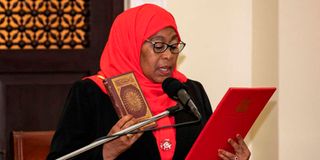Ask history, women have always led

New Tanzanian President Samia Suluhu Hassan holds the Koran during the swearing-in ceremony as the country's first female President after the sudden death of President John Magufuli at State House in Dar es Salaam, Tanzania on March 19, 2021.
UN Women says women’s equal participation and leadership at all levels of political and public life is essential to achieve the Sustainable Development Goals by 2030.
Women are serving, and have served, as heads of state in only 22 countries and 119 countries have never had a woman leader; so, achieving gender equality in the highest positions of power could take more than 130 years.
Even with the Beijing Declaration and Platform for Action on balanced political participation and power-sharing between men and women in decision-making spaces, many countries are yet to achieve gender balance and very few have set targets on gender parity (50-50).
As Tanzania celebrates the swearing-in of President Samia Suluhu Hassan as the first women Head of State in East Africa, the ensuing negativity, and how that has ruffled feathers, is absurd. The trending digital conversation and memes created to diminish her position and question her ability to lead portray the deep-rooted gender stereotypes against women.
Female pharaohs
However, the legacy of female leadership is legion. African history is replete with great female leaders. We have had female monarchs, chiefs, constitutional leaders and pharaohs — the likes of Cleopatra, who ruled ancient Egypt.
Nigeria had the Queen of Kano. In Angola, Queen of Zinga ruled in the 17th Century as a warrior. In the 20th Century, we had Empress Zaudifu ruling Ethiopia for 13 years.
These are rulers who, in their time, confronted colonialism, protected the environment, stood up for justice, fought to reduce poverty and ensured equitable access to education, employment and health for all.
Despite the evidence on great female leaders, however, many women across the world continue to suffer intentional killings, rape, female genital mutilation, unfair pay for work done, sexual violence and assault, limited education and leadership opportunities.





